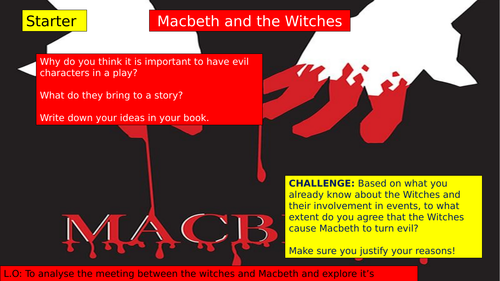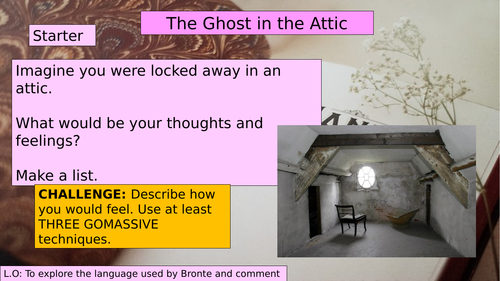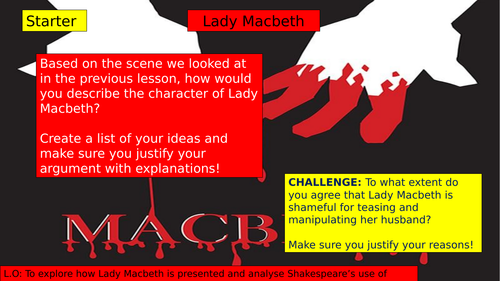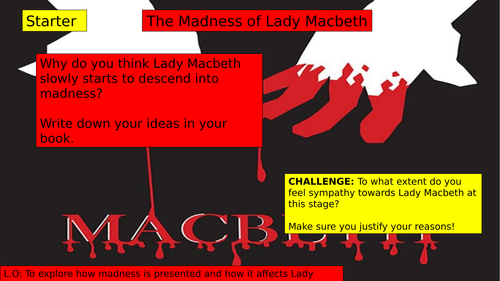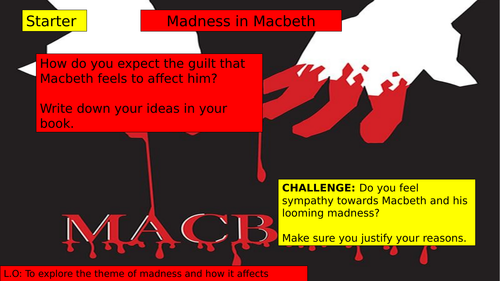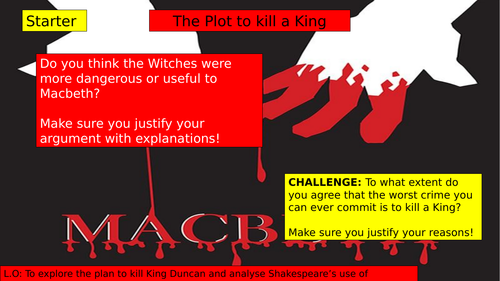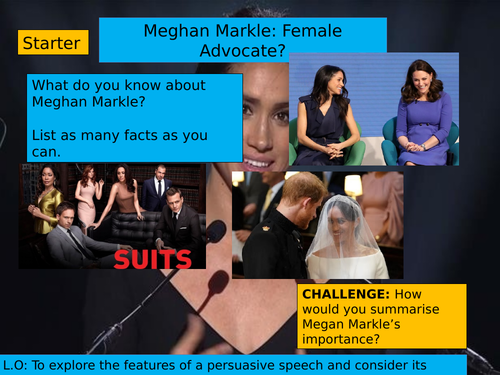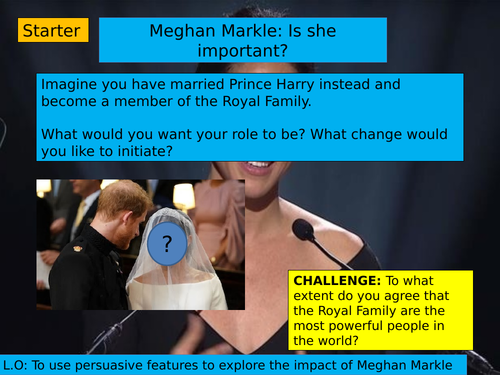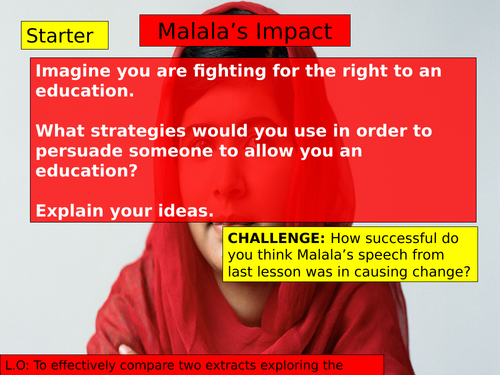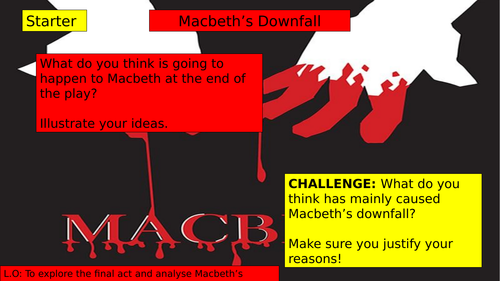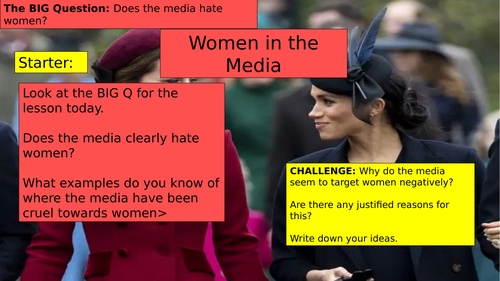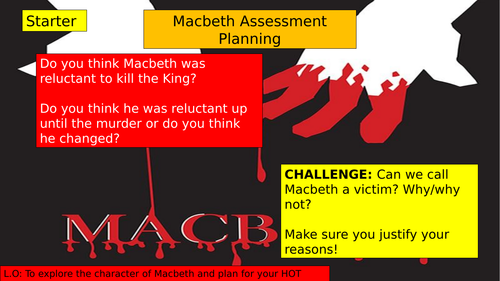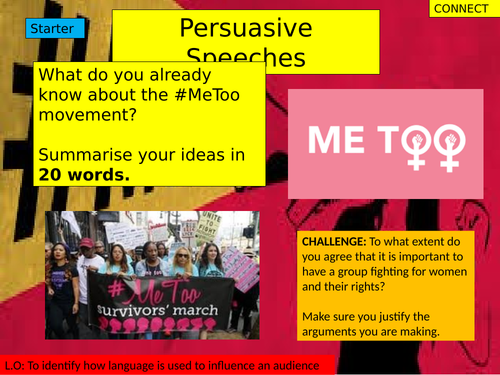60Uploads
18k+Views
4k+Downloads
English

Macbeth's first meeting with the Witches
This is one lesson for a middle-ability Year 9 class looking at the scene where Macbeth and Banquo first meet the Witches. The lesson predominantly focuses on the prophecies the Witches provide and the significance of these. The initial reactions of Macbeth and Banquo are also explored with supporting questions to answer. A model text of a paragraph responding to a GCSE-style question is also included, as well as the extracts of Macbeth and Banquo’s reactions. This can easily be adapted for any KS3 or KS4 class.

Exploration of Bertha in Jane Eyre
This is a lesson for a middle-ability Year 8 class who were looking at Gothic literature. This lesson focuses on an extract from ‘Jane Eyre’ where Betha is finally revealed to the reader. The lesson requires pupils to look at initial quotes and explore their interpretations before then reading the extract, annotating it and writing an analytical paragraph on the extract. The extract is included in this resource and sentence starters using the PEACE structure are also included to support students. This is easily adaptable for any KS3 or KS4 class.

Macbeth: Exploration of Lady Macbeth
This is one whole lesson for a middle- ability Year 9 class focusing on the characterisation of Lady Macbeth. The lesson focuses on a short extract and requires students to consider gender stereotypes during the Shakespearian era and how Lady Macbeth subverts them. The tasks are split into sections to make them more manageable and sentence starters are provided to support pupils in their writing. The extract for the lesson is also included and the lesson can be easily adapted to a KS3 or KS4 class of any ability.

Macbeth: Lady Macbeth's Madness
This is a middle-ability Year 9 lesson exploring the madness of Lady Macbeth. The extract of the crucial scene is included and pupils are required to consider how Lady Macbeth is presented in the scene and how they respond to her madness. T make it more manageable, a table has been provided that requires pupils to find evidence in the extract to support statements made and they will also need to identify language techniques used. There are also sentence starters provided to support pupils in writing an analytical response. This lesson is easily adaptable to a KS3 or KS4 class of any ability.

Macbeth: Madness
This is a middle-ability Year 9 lesson exploring how madness is presented in Macbeth. The banquet scene (extract included) is explored in the lesson and pupils will consider the level of guilt Macbeth is experiencing and the effect it is now having on him. A video clip is also included showing the banquet scene from the Michael Fassbender adaptation (to allow them to see the scene played out and understand the extent of madness Macbeth is experiencing). The tasks relating to the extract have been broken down into manageable tasks and a model text is also included to support pupils in beginning to write a GCSE-style response. This lesson is easily adaptable to a KS3 or KS4 class of any ability.

Macbeth: The Plot to kill a King
This is one whole lesson for a middle- ability Year 9 class focusing of Macbeth and Lady Macbeth plotting to kill King Duncan. The lesson focuses on a short extract from the scene and requires students to consider gender stereotypes during the Shakespearian era and how Macbeth and Lady Macbeth subvert them. The tasks are split into sections to make them more manageable and sentence starters are provided to support pupils in their writing. The extract for the lesson is also included and the lesson can be easily adapted to a KS3 or KS4 class of any ability.

Macbeth: Exploration of Macbeth
This is a middle-ability Year 9 lesson focusing on the characterisation of Macbeth and Shakespeare’s use of symbolism through a dagger. The short ‘Is this a dagger I see before me?’ soliloquy is explored in the lesson (the extract is included). It has been divided into sections to make it more manageable for pupils to identify language techniques used and the consider the effect they create. Also included, is a short video of the Patrick Stewart performance to help pupils understand how the scene would be played out and to help them with their understanding of Macbeth. Sentence starters are also provided to support them with their writing. This lesson is easily adaptable for a KS3 or KS4 class of any ability.

(KS3 7/8/9) Meghan Markle's UN Speech
This is a lesson planned for a middle-ability Year 8 class looking at Meghan Markle’s UN speech. Pupils will consider who Meghan Markle is before watching her speech and analysing an extract of it. The lesson focuses on a Language Paper 1 Q3 style question, so pupils will be introduced to structural features. There is support provided to help pupils write a response through a model text. This lesson is easily adaptable for any KS3 class of any ability.

(KS3 7/8/9) Meghan Markle's Impact
This is a lesson planned for a middle-ability Year 8 class looking at the impact of Meghan Markle. Pupils will debate the impact she has had so far before considering writing a newspaper article persuading the audience that she has or hasn’t made a significant impact. There is support provided to help pupils with writing with a catchy headline activity and sentence starters. This lesson is easily adaptable for any KS3 class of any ability.

(KS3 7/8/9) Malala's Impact
This is a lesson planned for a middle-ability Year 8 class looking at English Language Paper 2 Q2 skills. Pupils will debate the impact of Malala before looking at extracts presenting two different attitudes towards the impact Malala has had. There are activities to support pupils with making comparisons and a model text to support them with their writing. This lesson is easily adaptable for any KS3 class of any ability.

Macbeth: Macbeth's Downfall
This is a middle-ability Year 9 lesson focusing on the final scene of Macbeth and his downfall. Pupils will need to consider who they think is responsible for the downfall of Macbeth and they will consider why they think the play ends with his death and why Shakespeare may have done this. The tasks are split into manageable activities that allow pupils to analyse key language techniques and the effects and meanings they create. A debate activity is also included to allow pupils to practice supporting an argument and this will also support them in then writing GCSE-style paragraph(s) exploring alternative arguments and interpretations. This lesson is easily adaptable to a KS3 or KS4 class of any ability.

KS3 (7/8/9) Women in the media
This is a lesson planned for a high-ability Year 7 class looking at injustice and how women are treated by the media. Pupils will look at an array of famous women and look at newspaper articles comparing their treatment. There will be activities supporting them in picking out key quotes and language devices, before discussing these. Students will then focus on the different representations of Kate Middleton and Meghan Markle in the media. The final activity will require students to write an analytical paragraph exploring how the language represents the women. This lesson is easily adaptable for any KS3 class of any ability.

Macbeth: Macbeth's uncertainty GCSE-style assessment
This resource consists of two lessons focusing on a GCSE-style assessment. This has been planned for a middle-ability Year 9 class. The lesson focuses on the idea of whether Macbeth is truly a victim or not and requires pupils to consider a GCSE-style question on this where they must analyse an extract but also comment on other parts of the play. The first lesson focuses on them exploring the extract and planning a response (planning sheet included focusing on a PEACE structure) and the second lesson is more brief, allowing them plenty of time to write their assessment. This resource is easily adaptable for any KS3 or KS4 class of any ability.
Bundle

AQA GCSE POWER AND CONFLICT POETRY
This is a GCSE revision bundle focusing on key themes explore in the Power and Conflict poems. It includes a range of activities from: comparison tables, model texts to annotate and planning support to write GCSE-style responses. This is easily adaptable for any KS4 class of any ability.

Injustice themed bundle of lessons
This bundle consists of seven lessons focusing on the theme of ‘Injustice’, These English lessons were planned for a high-ability KS3 class, focusing on building key skills in relation to the English Language Paper 2 exam. The lessons focus on the #MeToo movement (involving an assessment to test pupils’ initial skills), two lessons focusing on the impact of Malala and writers’ differing attitudes to this and attitudes towards women in the media, as well as Martin Luther King’s famous speech. These lessons explore both analytical and creative writing skills and are easily adaptable for all KS3 class of all abilities.

Romeo and Juliet: Annotated (KS4)
I have created a booklet of 12 key scenes from Romeo and Juliet. These are:
The Prologue
Act 1, Scene 1: Sampson and Gregory
Act 1, Scene 1: Romeo and Benvolio
Act 1, Scene 2
Act 1, Scene 3
Act 1, Scene 5/ Act 2, Scene 2: Balcony Scene
Act 1, Scene 2: Romeo and Friar Lawrence
Act 3, Scene 1
Act 3, Scene 5
Act 4, Scene 3
Act 5, Scene 1
Act 5, Scene 3
The booklet contains extracts from each of these scenes and they are annotated by hand. Annotations include: terminology, analysis and contextual links.
This booklet could be used by the teacher, or as a resource for either revision, intervention or for students who may join later in a school year and have not studied the play.
Bundle

Macbeth Year 9 Bundle
This bundle consists of 8 lessons focusing on key scenes from Macbeth and supporting pupils with key skills such as identifying language techniques, considering their effect and why Shakespeare has used them and writing GCSE-style responses. All lessons have key extracts included and sentence starters are also included to support pupils with the structure of their writing. These lessons are aimed at a middle-ability Year 9 class but they can be easily adapted to any KS3 or KS4 class.
Bundle

KS3 (7/8/9) The Lady of Shalott Bundle
This bundle consists of 13 lessons worth of analytical and creative writing activities exploring the poem ‘The Lady of Shalott’ by Alfred Lord Tennyson. The lessons include activities supporting with selecting quote, identifiying language techniques and analysing quotes in more detail. In this bundle, there are also creative writing activities and opportunities for students to create diary entries and newspaper articles based on their studies. There are two assessments included in this bundle too where pupils will write analytical paragraphs about how Lady Shalott is presented, to track progress throughout this SOW.
ALL WORKSHEETS NEEDED ARE AT THE END OF EACH RELEVANT POWERPOINT.
Bundle

(KS3 7/8/9) Women in Society SCHEME OF WORK
This is a bundle of an entire scheme of work focusing on women in society and how they are presented. This was planned for a middle-ability Year 8 class but can easily be adapted for any KS3 class of any ability. The scheme of work starts with an opening assessment getting pupils to write an argument about the role of women, before exploring how women have been presented in classical literature and modern society.

